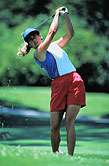Specializing in one sport as child no guarantee of future success

(HealthDay)—Some parents and coaches think kids who focus on one sport early on will boost their chances of a college scholarship or pro career. But a new study casts doubt on that idea.
In a study of undergraduates at the University of California, Los Angeles—a power in college athletics—researchers found no evidence that athletes at the school launched their careers at a tender age.
Instead, the student-athletes looked a lot like their peers who simply enjoyed recreational sports: They usually dabbled in different sports as children, and waited until their teens to focus their attention on one sport.
"Most successful athletes participate in a number of sports when they're 6, 8 or 10 years old," said Dr. John DiFiori, chief of sports medicine at UCLA's School of Medicine.
That way, kids learn different skills and have the chance to discover which sport they truly enjoy, said DiFiori, who is scheduled to present the findings this week at the annual meeting of the American Society for Sports Medicine, in New Orleans.
There's a common belief that children need to zero in on a sport early in order to rise to an elite level, according to DiFiori.
"I think some parents have been influenced by specific, famous examples, like Tiger Woods or Andre Agassi," he said.
But while examples like that stick in people's minds, the actual research evidence paints a different picture, according to Dr. Neeru Jayanthi, medical director of primary care sports medicine at Loyola University, in Chicago.
"From a success point of view, early specialization is potentially detrimental," said Jayanthi, who was not involved in the new study.
In his own research, Jayanthi has found that children and teens who train intensely in one sport are more prone to overuse injuries than their peers who have varied activities.
Based on his findings, Jayanthi recommends some limits on kids' sports participation. One suggestion is that the amount of time a child spends in organized sports should be no more than double the time devoted to unstructured play and exercise.
"We think playing for fun is actually protective against injuries," Jayanthi said.
He explained that having varied activities—including "free play"—allows kids to develop skills and physical abilities that can help them in the long run.
The current findings are based on 296 UCLA student-athletes involved in 22 sports, and 164 students who weren't into elite sports, but were active and played sports for fun. Overall, DiFiori's team found, both groups started playing organized sports around the same age—usually before age 10. And student-athletes were no more likely to have started before age 6.
What's more, there was no evidence that student-athletes "specialized" earlier. Most commonly, they settled on a sport during high school.
Where the athletes did stand out was family history: They were more likely than other students to have a parent or sibling who played sports in college or professionally.
Of the athletes, 43 percent had a parent who played college or pro sports, versus 8 percent of the comparison group. And 28 percent had a brother or sister who played college or pro sports, versus 5 percent of the other group, DiFiori said.
So that does mean athletic prowess is all in the genes? Not likely, DiFiori said. Although genes do play a role in athleticism, he noted, children of athletic parents probably also get a lot of support and encouragement to pursue sports.
"None of this means that practice and focus aren't important," DiFiori said.
But pushing your child to specialize in a sport early in life won't compensate for a lack of athletic genes, Loyola's Jayanthi said. And at worst, it could do harm if it leads to burnout or an injury.
DiFiori said that one of the issues in youth sports these days is the emphasis on "competition and winning," rather than building skills. But it is those skills—which can be transferred from one sport to another—that ultimately help kids become better athletes, he said.
Because this study was presented at a medical meeting, the data and conclusions should be viewed as preliminary until published in a peer-reviewed journal.
More information: The American Academy of Pediatrics has more on preventing kids' sports injuries.
Copyright © 2014 HealthDay. All rights reserved.















